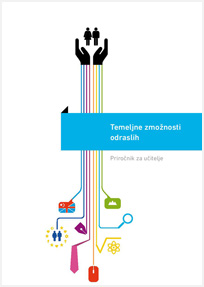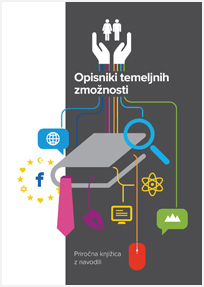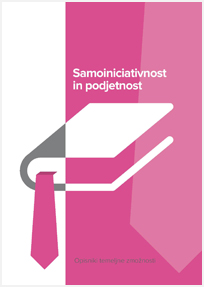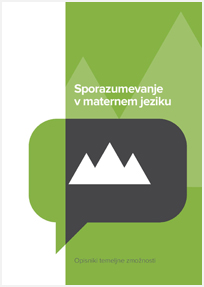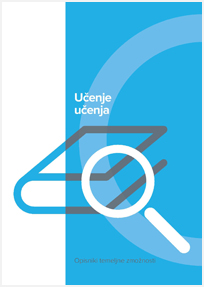Booklets and handbooks
The following materials are for now available only in the Slovenian language:
- Poročilo s primeri opisnikov temeljnih zmožnosti in njihove uporabe (Title in English: Report with examples of descriptors of the key competences and their application)
- Metodološki načrt izpeljave projekta: Metodologija za pripravo opisnikov temeljnih zmožnosti (Title in English: Methodological plan for project implementation: Methodology for the preparation of key competences descriptors)
- Metodologija za pripravo opisnikov temeljnih zmožnosti na področju temeljih zmožnosti učenje učenja, sporazumevanje v slovenskem jeziku, matematična kompetenca ter samoiniciativnost in podjetnost (Title in English: The methodology for the preparation of key competences descriptors in the key competence domains of learning to learn, communication in Slovenian language, mathematical competence and sense of initiative and entrepreneurship)
- Temeljne zmožnosti odraslih: priročnik za učitelje (Title in English: Key competences of adults: Teacher Handbook)
The handbook is designed as a tool for teachers working in the education of vulnerable groups and occasionally encountering adults undergoing education as well as those expert associates who come into contact with adults in their work.
The handbook content is divided into three content lots:
- Literacy and Key Competences;
- Characteristics of Adults from Vulnerable Groups and
- Practices from the Work with Adults from Vulnerable Groups.
A sub-chapter entitled Practical Aspects and Tips for Personal Deliberation is added at the end of each content lot.
- Booklets with descriptors
Booklets with descriptors give a short description of a part of a key competence – the very essence of a key competence – and try to make it reflect real life as much as possible. In addition to the general description and concrete adaptation of the key competence, the booklets also feature in-depth reflection on the key competence in the educational practice of experienced teachers and mentors as well as experts who pursue the key competence domain in terms of research and theory.
Descriptors are a useful and beneficial tool mainly for educators who teach adults, but are also generally useful for anyone involved in adult education or for adults to help them realise the importance and place of the key competence in their everyday life.
- Priročna knjižica z navodili za uporabo (Title in English: Handbook with instructions for use)
The handbook presents detailed information on the project and importance of the key competence descriptors. It provides a methodological basis for the definition of descriptors and presents the creation of the key competence descriptor booklets and practical tips for their use for didactic purposes.
It represents the theoretical foundation for the concept that is reflected in the short booklets about individual key competence intended for use in everyday practice.
- Opisniki temeljne zmožnosti Samoiniciativnost in podjetnost (Title in English: Descriptors of the “self-initiative and entrepreneurship” key competence)
The booklet gives a detailed description of the “self-initiative and entrepreneurship” key competence which represents the realisation of an individual’s idea that encompasses creativity, innovativeness, risk-taking and the ability to plan and manage projects in order to achieve a concrete goal.
It is useful for individuals in the workplace, in understanding the background of the work and exploitation of offered opportunities. It will also serve them well in their everyday life and in society in general.
- Opisniki temeljne zmožnosti Sporazumevanje v maternem jeziku (Title in English: Descriptors of the “communication in the mother tongue” key competence)
The booklet presents the “communication in the mother tongue” key competence which represents the ability to express and understand terms, thoughts, emotions, facts and opinions in written and spoken form (listening, talking, reading and writing) and spoken interaction in a suitable and creative manner in all social and cultural contexts such as education and training, work, the home and free time.
- Opisniki temeljne zmožnosti Učenje učenja (Title in English: Descriptors of the “learning to learn” key competence)
The booklet provides detailed information on the “learning to learn” key competence which represents the ability to learn and to persevere in the learning endeavour as well as organise one’s own learning, including effective time and information management, i.e. individually and in groups.
This booklet helps the reader build the awareness about their own learning process and needs, about recognising opportunities available to them and the ability to overcome obstacles in order to learn successfully.
- Opisniki temeljne zmožnosti Matematična kompetenca in osnovne kompetence v znanosti in tehnologiji (Title in English: Descriptors of the “mathematical competence and basic competences in science and technology” key competence)
The booklet describes the complex key competence made up of two components. Mathematical competence and basic competences in science and technology represent the ability to master and use the mathematical way of thinking to solve many everyday problems. It encompasses the ability and preparedness to use mathematical modes of thinking (logical and spatial thinking) and methods of presentation (formulae, models, constructions, charts and tables).

